There’s no reason to be long-winded about a decade of Merry-Go-Round Magazine, as I don’t really have anything to add to a big piece Thomas wrote on the site that accurately summarizes the trajectory of Merry-Go-Round (fka Crossfader) over a decade. But I will share an important revelation I had in putting together our big MGRM10 event last weekend that I think applies to the takes you’re about to read.
Part of our big 10th anniversary celebration involved throwing the weekly dance night that Zebulon hosted. And while my initial requests about having various DJs do b2bs for the evening were denied, as they weren’t mainstream enough for a venue of that size, we did eventually settle on building an evening around the actual anniversary date—2015. We cheekily called it EMOTION: A 2015 Dance Night, built somewhat around the Carly Rae Jepsen album which I played a majority of. But to me, a dance night is interesting with visuals, and that required me building a visualizer that included music videos, movies, TV shows, video games, and plenty of headlines, Tweets, and memes to put us in the headspace of that year.
And friends, it was fucking painful. It was horrible. Just a dreadful year for any kind of pop culture—a few diamonds in the rough but, boy, mostly rough.
And as the dance party was going on—and as I was getting yelled at by no less than 40 women of varying ages requesting songs that the theme would simply not allow me to play (Bad Bunny didn’t make any songs in 2015, I’m sorry!)—I realized that my hatred of the thing I’d pitched and built (the visualizer, the music, the drops) is the thing that birthed Crossfader 10 years ago in the first place. A group of young people being like, “Everything sucks, but here’s what’s good and here’s what’s bad,” is how any of these enterprises start, and getting to experience in real-time every single thing about 2015 all at once (from the Chainsmokers, to the failed Bradley Cooper vehicle BURNT, to pizza rat, to the finale of TWO AND A HALF MEN), I had some sense of enlightenment: a renewed grasp of why it was important this whole thing started in the first place.
Below you’ll see a group of people who lived 2015. People who were there wondering, perhaps, why things were so bad. But just know that out of the bad stuff came the very website you’re reading—Merry-Go-Round Magazine.
We have one more MGRM10 event, a screening of MAGIC MIKE XXL at The Frida Cinema on August 30th. Come with your assless chaps and say hey to a few of us before we start looking forward to the next decade. – CJ Simonson, Editor-in-Chief
WHAT WE WERE RIGHT ABOUT
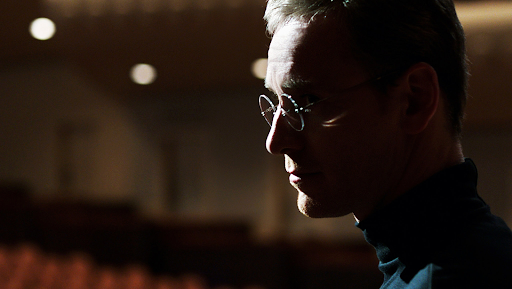
STEVE JOBS Is the Most Important Biopic of the 21st Century
STEVE JOBS, directed by Danny Boyle and penned by Aaron Sorkin fresh off of THE SOCIAL NETWORK, was largely dismissed at the time of its release. While it garnered positive reviews, most critics and audiences felt as though Sorkin was repeating himself with yet another story about an arrogant tech mogul building an omniscient platform. In 2015, that was certainly an understandable perspective. Tech companies were still seen as innovators, pioneers who were going to make all of our lives easier and more connected with the world around us. Jobs had passed away just four years prior and the overall sentiment seemed to be “Who really cares about his dirty laundry?” He gave us the Mac and the iPhone. The film comprises three lengthy sequences, each documenting high-octane drama preceding product announcements for the Macintosh (1984), NeXT (1988) and iMac (1998). Unlike THE SOCIAL NETWORK, there is no pretense suggesting that Jobs (Michael Fassbender) might be an abrasive but misunderstood genius. He is the embodiment of pure destructive hubris. We learn that he took credit for designs that he didn’t invent and was forced out by the Apple board for not being flexible following a failed product launch. Long before the iPod ever launched, he was understood by those who knew him as a huckster who conned himself into thinking he was the next Einstein. It contains Sorkin’s most acerbic, fast-paced writing, propulsive direction from Boyle that shifts visual style with each era, and career-best performances from the entire cast. This unambiguously negative portrayal of a tech tyrant is far more in line with how society views the likes of Elon Musk and Jeff Bezos in 2025. In the tradition of Shakespere, Sorkin cuts down to size the man who arguably was the blueprint for this modern archetype. Jobs may not have dipped into politics or ravaged the environment in pursuit of instant stock and transit of goods, but he likely would’ve had he lived a little longer. Just this once, God did us a favor. [Michael Fairbanks]
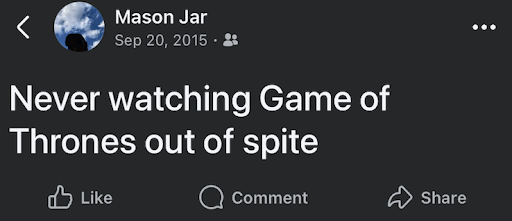
GAME OF THRONES Sucks
I have no problem with self-identifying as a big ‘ol nerd. I’ve decided to wear it as a point of pride, especially as I pursue an MSLIS, maybe the nerdiest of all advanced degrees. Yet my nerdiness has its limits, and despite a fondness for Peter Jackson’s LORD OF THE RINGS, my interest in engaging with popular fantasy is essentially zero. So when GAME OF THRONES was becoming a nascent phenomenon in my late high school/early college years (God help me, where does the time go), I knew very quickly it was not for me. That didn’t stop seemingly all of my peers trying to convince me to watch the fucking thing. I’m not sure exactly when I decided I’d never watch an episode of GAME OF THRONES on my own volition. In my youth I had a strident streak against anything I felt was overhyped. The more people tried to convince me to watch something, the less I felt compelled to do so. I only relented on watching MAD MEN because a girl I had a crush on convinced me to watch it, but no objects of my affection were demanding I tune in to the dragon show at any time, and I couldn’t care less if it was getting good marks on the AV Club or whatever. This unmitigated haterdom got tuned up when the show swiped its first Best Dramatic Series trophy away from the final season of MAD MEN at the 67th Emmy Awards. In the heat of that moment, I sent out the above Facebook post.
I felt entirely vindicated in later years as the showrunners had less and less source material to work off of and they had to rely on their limited creative skills to bring the story to a close. I try to keep my “told-you-sos” to a minimum, but I couldn’t help myself as more and more of my friends shared their exasperation with the final season and series finale (the cast’s reactions during the table read—pure, beautiful schadenfreude). In the years since GAME OF THRONES’ universally loathed ending, and despite HOUSE OF THE DRAGON’s critical popularity, are people rushing to do full series rewatches? Will the (allegedly) sex-allergic post-millennial generations navigate over to the incest and rape show on their parents or roommate’s HBOMax accounts? Are the kids named Daenarys or Tyrion asking to be referred to as “Sally” and “Jeff”? These are questions I don’t know the answer to, nor do I care. In the interest of full disclosure, I do have to say that I did end up watching two mid-S6 episodes of GOT with my roommate shortly after I moved to LA. I’m content to let those maybe two full episodes I watched on a busted futon in 2016 be my only direct engagement with the show. Call me spiteful, call me close-minded, I didn’t care then and I certainly don’t care now. I was right. I won! And ultimately, why should I start a million episodes of some dumb swords and furs bullshit when I could just as easily rewatch GIRLS? [Mason Maguire]

2015 Sucks
I always knew that 2015 sucked. The movies sucked, the music mostly sucked, the culture sucked, the jokes sucked, the trajectory sucked, and the guarantees sucked. When you’re surrounded by rosy college sophomores, thinking everything sort of sucks definitely voided some social contracts people had thought they signed with me as a perky 2014 freshman, but I also don’t give a shit, because the last thing I was going to do was lie to myself. 2015 was a media parade of horrific mass shootings that were met with RT-baiting Tweets and a bland Obama address that would always feel too little and too late; the public would quickly move on, but isn’t it the President’s job to… Do… Something about constant murder? The performative civility of the Obama era and mainstream media’s earnest embrace of a post-racial utopia felt real and true, even if every day brought a new tragedy. You sort of just assumed those were daily one-offs, but then you read back the phrase “daily one-off” and realize you’ve been trapped. It’s the type of quicksand that had me convinced a Trump presidential campaign was a benefit to everyone, because it’d be such a disaster that it’d probably tank his empire. One party, I was neck-and-neck with a Beta Theta Pi jerk-off who kept making up new rules so I wouldn’t beat him in champagne pong. As it turns out, you can just cheat and no one will really stop you, because the ones you most want to swirly are also the ones you can’t afford being sued by their daddies’ lawyers for your lifeblood.
The intellectual space race of being a college student had me mainlining every David Lynch, BET classic, Atlanta trap, Italo-schlock, Herzogian, G-funk, and South Korean cinema blindspot while falling fast out of love with STAR WARS, BACK TO THE FUTURE, and other formative childhood franchises that already reeked of the soon-to-be bled dry carcasses that wrapped up memories of yesteryear in butcher paper. I’m 19 years old, you expect me to get excited about Disney’s theatrical lineup when EL TOPO exists? The gross neediness and forceful possessiveness of “Hotline Bling” went unheard, DIRTY SPRITE 2 was “too scary” to be played at house parties, and when you go to school in Orange County (and are subject to an online discourse dominated by Pitchfork’s reader demographics circa 2015), well, there’s not a lot of folks to talk about TO PIMP A BUTTERFLY with. Even when the music was great—and in much rarer moments, when the movies were passable—there weren’t a whole lot of people to celebrate the Chainsmokers-scored moment with. THE FORCE AWAKENS, KINGSMAN, ANOMALISA, INSIDE OUT, SICARIO, and EX MACHINA were among the most celebrated flicks of the year despite their criminal mediocrity; it’s one of American history’s most normal years, the type of wistful nostalgia millions of post-COVID survivors crave, but it saw an entire international population frozen in place with no vision forward and, even back then, fawning affection for what once was. Several dozen college students were spewing norovirus-afflicted chunks from both mouth and ass thanks to what was suspected to be a cafeteria-wide poisoning via Chapman University’s food supplier, my immediate community coated in feces and vomit: In 2025, I’ve still got some on my shoes. [Kevin Cookman]
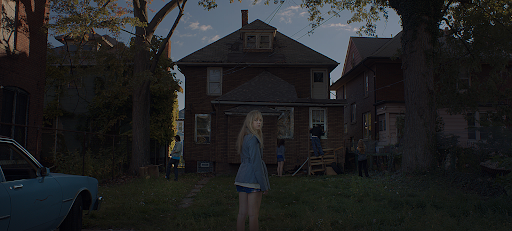
Getting On the TANGERINE and IT FOLLOWS Hype Trains Early
I had pretty bespoke taste in 2015 while still being a 25-year-old shithead. I thought AGE OF ULTRON and JURASSIC WORLD were horrific movies made by seeming sex criminals. FALLOUT 4 was mid-to-bad. STRAIGHT OUTTA COMPTON was exactly like a theatrical version of those VH1 made-for-cable movies they would make 20 years ago, down to the album title being the name of the movie. Through it all, two films’ exemplary combinations of vibe and setting stick with me when I think of 2015 as a snapshot of my two homes. Sean Baker’s TANGERINE was filmed in the same couple-block radius that I lived and worked in when I first moved to Los Angeles. Despite the lo-fi filters and “Shot on iPhone” gimmick, the sun-drenched faux-Technicolor that it captures is a vivid time capsule of a Hollywood free of a gaudy, midwit Tesla diner and other horrors of gentrification—things that have rendered our fair city more like GTA V a decade after GTA V. ANORA was a mere 35mm recreation-cum-spiritual-sequel and didn’t have half of the charm as its predecessor. With vibrant, funny, enlightened performances from Mya Taylor, Kitana Kiki Rodriguez, and stalwart regular Karren Karagulian, TANGERINE tackles similar but stickier subject matter with more depth and empathy than ANORA’s doe-eyed oculesics. Alternately, filmed in the same Metro Detroit locales I went to college (and with protagonists who canonically went to my very same school), I have always felt a strong connection to David Robert Mitchell’s IT FOLLOWS, an exemplar of modern horror. Empty office parks and dilapidated parking garages that become liminal, hypnagogic spaces; I’ve parked in lots that may as well have been shooting locations for IT FOLLOWS. I’ve crushed beers in these lots on the outskirts of the suburbs, listening to music and laughing with friends in our parked car as I scanned the overpass in the distance, spying the silhouettes of couples coupling underneath. The normal and suburban become existentially terrifying under Mitchell’s constant use of foreboding slow zooms. He followed IT FOLLOWS with the underappreciated UNDER THE SILVER LAKE, and I greatly anticipate anything else he’s cooking up, including *sigh* THEY FOLLOW. [Luke Phillips]
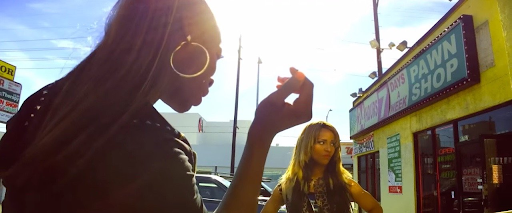
Sean Baker Is the Next Big Thing
Post-film school graduation, I was diving deeper into indie film and searching for new projects that were gritty and surprising. Enter TANGERINE, which knocked me flat. The movie, directed by then-unknown director Sean Baker, made headlines for being shot entirely on iPhones, which could have felt like a gimmick in lesser hands. But even a decade later, I revisit TANGERINE and it never feels like a novelty. The magic in his films lies in their humanistic quality, which tells slice-of-life stories about the invisible in our society. By shining a light on transgender sex workers, we were exposed to more than just the hustle, their everyday moments of friendship, joy, and heartbreak, without their stories falling into caricatures or tragedy porn. More than just the overall achievement of beautiful cinematography and sharp screenwriting, Baker respects his subjects. His lens dignifies the working class and those living under the poverty line in a way that doesn’t feel preachy, just honest. Watching TANGERINE, I had this gut-level certainty: This guy is going to be huge. I wasn’t thinking “Best Director” huge at the time, but I was hungry to see what he would do with bigger budgets and more resources. By the time THE FLORIDA PROJECT and RED ROCKET were released, I knew that my hunch about Sean was correct. No matter what you throw at him, his pictures will keep the same pure beating heart. [Lauren Chouinard]
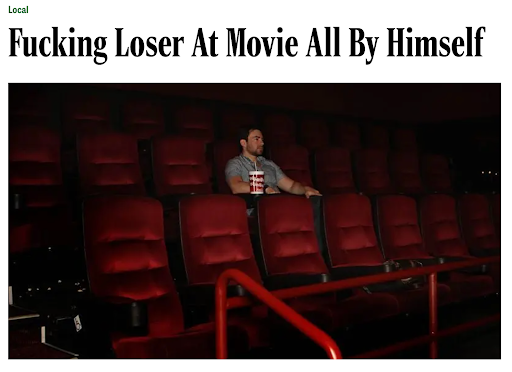
Embracing the Freedom of Going to the Movies Alone
2015 was the year I got into the habit of going to movies alone. I was an anxious 17-year-old and I already had a terminal video rental habit, but there was a lot more shame involved with trotting my corpse out in public to see a movie than watching movies alone at home (maybe there still is for many people). If I hadn’t freed myself from the shackles of the anxiety of going to the movies alone, I never would have discovered some 2015 favorites that I still revisit to this day, such as Yorgos Lanthimos’ THE LOBSTER at Naro Expanded Cinema (which is still standing) or Agnieszka Smoczyńska’s THE LURE at the Bijou Film Center (which is not). The real shame would have been not connecting with cinema in a meaningful way just because I couldn’t find anyone who wanted to go with me at the time. I’m so grateful to the programmers who felt it was necessary to show offbeat films in a mid-sized, mid-Atlantic city; there are arthouse audiences to be found everywhere. [Katarina Docalovich]
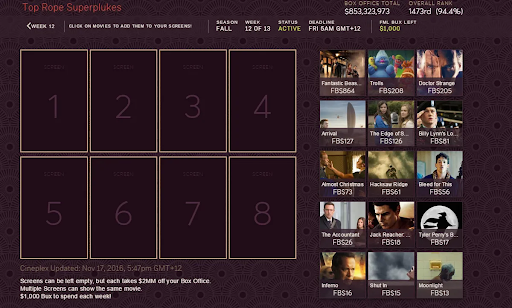
Box Office Watching Was About To Become Toxically Mainstream
When then-ESPN Fantasy Football Senior Writer Matthew Berry launched Fantasy Movie League in May of 2015, I was there day and date. A daily fantasy-style box office game? Sure, why not. Playing weekly in that league was exhausting; you realize that the strength of most fantasy sports is that you do eventually get time off, as they’re seasonal. 52 weeks straight of maintaining a fictional cineplex against 1000s of other nerds becomes a lot at a certain point. But from within that level of analyzing came a certain degree of predictive Hollywood understanding. Yes, there was the pure strategy involved, a kind of removed gamesmanship employed that can be applied to any game—you don’t have to watch the NFL to run a fantasy football league of course—but you’d also just see trends, like the fact that the popularity of Christian filmmaking was well on its way in 2015 and 2016 pre-Trump, or that superhero fatigue was already beginning in its early stages even pre-COVID.
At the core of Fantasy Movie League was the forum, which featured a nerdy discourse about the game, studio marketing, weekend returns, and more on a daily basis. And it should be noted that Matthew Berry’s mainstream reach with the game was sizable—legalized sports gambling was still in its infancy, and Fantasy Football in its traditional form reigned supreme. So niche as it may have been, what resulted was a mix of true film nerds and, frankly, a bunch of Lunchbox Joes who had never cared about how much money a movie made in their lives prior to the game. And like all things a decade ago, in a vacuum that kind of spirited discussion is fine. But troublingly, you were starting to see this same kind of detached art and commerce speak bleed outside of the forums—punditry like this has certainly always existed, but a weak Marvel year (ANT-MAN and AVENGERS: AGE OF ULTRON) colliding with a rising chorus of Snyder Bros and DCU truthers who only had MAN OF STEEL to hang their hats on, Pixar’s first true bomb (THE GOOD DINOSAUR), MAD MAX: FURY ROAD coming up short to kick off the summer blockbuster season, the surprise success of Clint Eastwood’s AMERICAN SNIPER, and more dominating headlines you’ve surely forgotten were fodder for a new, toxic kind of armchair expert. You could feel it growing in 2015, and 10 years later we may not have the website anymore, but everything online is just Fantasy Movie League. [CJ Simonson]
WHAT WE WERE WRONG ABOUT
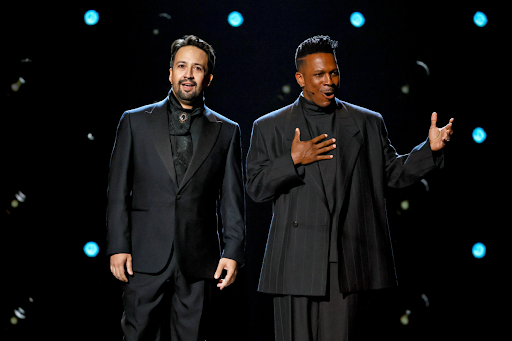
HAMILTON Is Just a Phase, and Everyone Will Get Over It
As an unabashed Theatre Kid(™), I’ve seen my share of musicals that feel revolutionary in the moment but wilt fast—for example, AVENUE Q or RENT post-cultural peak. When I first heard about HAMILTON, I had faith in Lin-Manuel Miranda because I had adored IN THE HEIGHTS, but rapping through the American Revolution admittedly sounded like a cringey high school history project. When the show blew up, I enjoyed it, but I wasn’t climbing the walls like my fellow theatre geeks. I figured it was a flash in the pan, destined to fade in a couple of years.
Cut to 2025: HAMILTON is celebrating a decade on Broadway, still selling out, still culturally relevant. It’s become a gateway drug for new audiences to fall in love with Broadway. The pro-shot on Disney+ opened the floodgates for conversations about filming and distributing theatre, making the art form more accessible. The “HAMILTON effect” also fueled momentum in pushing for racial diversity on stage, not just in casting, but in whose stories get told. The ripple effects have empowered more artists to bring their “weird” ideas to the table and actually get them produced. Like damn, look around, look around, at how lucky we are to be alive right now! Sometimes, being wrong feels great. [Lauren Chouinard]
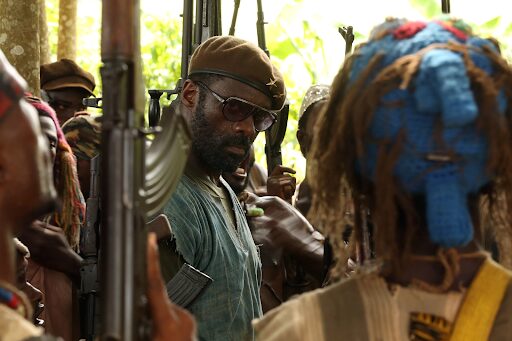
Netflix’s Emergence Into Original Films Would Be a Net Positive For Hollywood and Movie Theaters
I haven’t returned to Cary Joji Fukunaga’s BEASTS OF NO NATION since its release. My memory of it is as a solid-enough theoretical Oscar contender, failed by its distributors’ then-naive approach to awards promotion. Outside of the underseen and underappreciated THREE THOUSAND YEARS OF LONGING (someone reading this just did a fist pump, I just know it), it’s the only good Idris Elba performance of the last 10 years—one that easily could’ve been good enough for a Best Actor nomination ahead of the likes of Matt Damon and Bryan Cranston that year. And the good will Fukunaga walked in with after crafting the look and feel of season one of TRUE DETECTIVE paid off with a film that had a dramatic and beautiful, albeit very chic, look by comparison to other African war dramas that recently preceded it. Would these things hold up 10 years down the line, especially after grooming and abuse accusations against Fukunaga? I’ll never know.
BEASTS OF NO NATION saw no Oscar love. Outside of some Independent Spirit Award nominations and a pair of SAG nods, it was broadly not an awards contender at all. And most of that you have to assume was because of the role the film will play as an asterisk in the history books as Netflix’s first feature-length film. It was released in 31 theaters, making roughly $90k at the box office—a rollout that at the time was seen as a bomb but also a secondary play by the streamer. The promise of the idea that Netflix could operate two-fold, as a streamer but also a distributor who could supply both big blockbusters and awards fodder to the theater even on a limited basis, was certainly a point of discussion at the time. But that idea is just that, a promise, one that we’ve been endlessly debating, critiquing, and now dismissing for 10 years—GLASS ONION, CHRONICLES OF NARNIA, HIT MAN, DA 5 BLOODS, the list goes on and on and on. Hell, just months after BEASTS OF NO NATION, the Adam Sandler western comedy THE RIDICULOUS 6 would become a better historical reference for Netflix’s release strategy, a streaming-only slop fest that was praised in the moment as the future of the way the streaming service would operate. I’m not saying I thought Netflix was going to be the next Warner Bros., but I did think they’d at least TRY and be the next Warner Bros. Fuck me for wishing, I guess. You can hopefully maybe kinda see Guillermo Del Toro’s FRANKENSTEIN in theaters for three weeks this fall. [CJ Simonson]
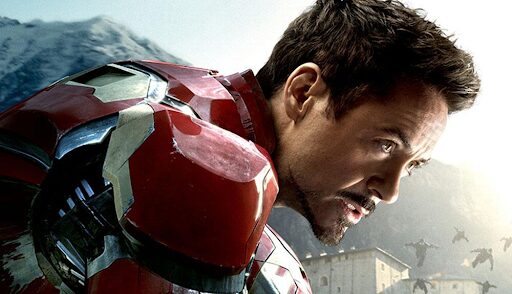
Tony Stark Is a Hero
Tony Stark is cut from the exact same cloth as Steve Jobs: a billionaire nepo baby technocrat obsessed with perfecting the art of weaponry. His character arc imagines a world in which a warmonger could experience something close to a moral awakening. Surrounding his body with armor instead of selling it to the highest bidder, he deems himself judge, jury, and executioner to whoever he perceives as a threat. In 2015’s AGE OF ULTRON, he invents the titular artificial intelligence designed for peacekeeping purposes that eventually goes rogue and tries to enslave the human race. At the time, this was a scenario only thought to be fodder for the movies. Eventually, the Avengers defeat Ultron and, after some tribulations in CIVIL WAR, this is all just regarded as a big whoopsie that ultimately leads to his noble self-sacrifice that saves the world from the ultimate threat that fueled his paranoia. The Jesus Christ of the United States of Disney. Tony Stark was the embodiment of cool for an entire generation of abrasive teenage boys. His ability to move through the world with droll humor disarming enough to bring anyone to his side felt attainable. However, we now find ourselves enslaved to the whims of a real-life Tony Stark on a daily basis, Elon Musk. Despite his best efforts to present as a charming renegade, he is chronically uncool and deeply insecure. He toys with space travel, artificial intelligence, the flow of information, and the structure of our government depending on his mood that day. In his mind, all he has to do is disarm us with internet humor that is a decade out of date, and we will fall in line behind him. Decades from now, perhaps there will be an alternate take on Tony Stark that adapts to this new world order and depicts him as an equally pathetic figure. It certainly feels unlikely as long as he remains under the thumb of Disney and at the mercy of perhaps the most pedantic fanbase on planet Earth, who would certainly deride such a take as “character assasination.” Tony will always exist as a perceived ideal for all 1%ers to strive towards. Musk and his ilk have an army of supporters who behave in the same hyperfixated, delusional way that chronically online Marvel stans do. They believe that deep down the intentions behind their madness are good, and that someday all they have achieved and sacrificed will be the thing to save us. Fat chance. [Michael Fairbanks]
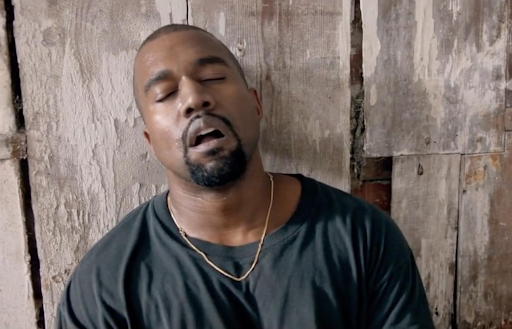
The Kanye of It All
I was rightfully leery of both Hillary and Trump in 2015, but let’s be real, I was also a huge shitlib and the biggest Online Kanye Defender in my social circle. I was massively wrong about Kanye—I thought he had a generational run of singles in 2015 and was so stoked he had Paul McCartney hopping on his tracks. But in retrospect, Kanye really was on his John Lennon shit in 2015, with the elegiac and Stevie Wonder-esque “Only One,” the Macca and Rihanna-assisted “FourFiveSeconds”, and the proto-Pablo of “ALL DAY.” I saw the “All Day/I Feel Like That” video at LACMA and counted the pairs of Yeezys I could spot. It all came crashing down within a year: the manic Pablo cycle, the bizarre SNL performances, culminating in the pivotal “I’M ON MY TRUMP SHIT TONIGHT” atop his PABLO tour platform/floating stage. We were about to lose the GOAT for good, and by his own hand. The Sisyphean tragedy of Kanye continues.
Hmm, let’s see, what else… I was a gigantic STEVEN UNIVERSE weeb, which is extremely embarrassing. Um, oh, I was pretty blown away by CREED when it came out and I thought it was a very strong and exciting effort from Coogler—“This is the guy they need to do BLACK PANTHER!” I thought as I was exiting the cinema. The monkey’s paw curled. [Luke Phillips]

I rarely, if ever, have wrong takes about anything. It hurts to admit it but it’s true. My good taste is as boundless as my humility, and as I scrolled through the Facebook archives to try and find some (semi-)public, decade-old opinions to reflect on, I was reminded of this fact. Heavy is the head which holds no bad takes…
[EDITOR’S NOTE: Please refer to the above image.]
Oh. Well. Ok.
Everything except for my college-era Kanye West takes have aged like fine wine.
Listen, let the millennial man who did not (even briefly) defend Kanye West at one time or another throw the first stone. And the opinion here is a relatively tame and fairly defensible one, especially in light of basically anything Kanye West has said in the last five or six years. For a bit of context: The above post was in response to Kanye pretending to rush the stage after Beck won Album of the Year over Beyoncé’s 2013 album BEYONCÉ, an act which was taken with good humor onstage by Beck himself. Overall, the event was pretty tame, and, come on, are you going to look me in the eye and tell me that Beck’s SEA CHANGE PART 2: I AM WEARING A HAT has left an ounce of the cultural impact that Beyoncé’s album had? Can you even tell me what that album’s actual title is without looking it up? On second blush, the text of this post holds up quite well. Hell, maybe even better now than it did back then. So, what’s exactly wrong here? Venturing into the comments on this post and others, I’m reminded of how I would spend valuable time in my 20s crafting nuanced responses to defend Kanye West. When I see a post like this, I think about how I denied myself so much joy in thinking music was about warring fandoms and picking the right millionaire to root for. The truth is music—like all art—is about ecstatic connection. What music is about, really, is every party in late 2013/early 2014 playing “Drunk In Love.” [Mason Maguire]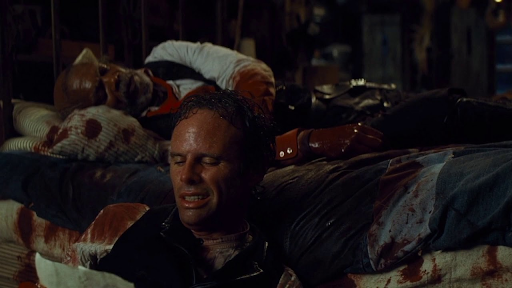 Growing To Accept THE HATEFUL EIGHT
Growing To Accept THE HATEFUL EIGHT
At a Cinemark that sold five-dollar tickets on Tuesdays in 2015, I went to see Quentin Tarantino’s THE HATEFUL EIGHT and absolutely despised it. I was (and still am) a big QT fan and was greatly disappointed; I found the whole thing quite offensive. Upon revisiting it now, I think the film just made me so uncomfortable that I outright rejected it. I didn’t have the courage to ask myself why it made me so uncomfortable. I don’t think it’s his masterpiece, but it could be his nastiest film, and this nastiness is certainly worthy of some exploration in 2025. I also believed Hillary Clinton would be president at the time, so there you go. [Katarina Docalovich]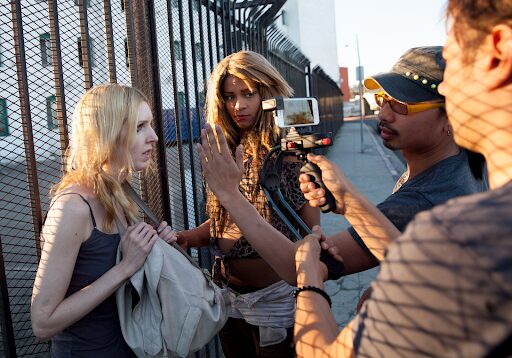
TANGERINE and the iPhone Will Revolutionize Cinema
No, TANGERINE’s prestige ushering of grassroots, guerrilla filmmaking with an iPhone and $100,000 did not fundamentally revolutionize cinema’s production model. Artists armed with nothing but an Android and a dream do not have an equal shot at professional success as a filmmaker putting themselves through the classical gauntlet of chasing down investors, dumping money into worthless shorts, or mining away at music videos until an agent comes for a 15% commission and a decade of dead-end digital marketing gigs. It is the same as it ever was. Want to score studio attention with a short film? It better have CGI that looks like a VFX House pulled it off. Honestly, a short has rarely ever cut it; the new demo reel is a $2 million debut feature. That’s it, end of story. Yes, you can technically make a movie with nothing but the tools in your pocket, but good luck getting anyone to fucking watch it.
Most doleful is how welcome it would’ve been at that very moment, and how the wonderful TANGERINE shot me up with such electricity that I was convinced the axis was bound to shift. Budgets were ballooning, stories were knotting themselves up to replicate AGE OF ULTRON’s bite of the multi-chapter apple, actors were securing decades-long contractual paydays, blockbuster attractions were signing away their ticket-selling cache to remain in the Netflix stable for the foreseeable future, and audience expectations were molded by the product instead of vice versa. Now, a bunch of Montana kids armed with refurbished iPhone 6s and a decent screenplay weren’t going to alter the course that Disney and Netflix were bouldering towards, but if there was ever a time to carve out an inlet for a wave of micro-budget vigor that could appeal to the sensibilities of a generation already gnawed away at by the early onset of short-form video and devastatingly detached irony, this was it. I mean, fuck, you’re telling me Kenneth Lonergan couldn’t knock out feature-length one-acts with a boom operator and a phone? A decade later, there are two worlds: one where your aunt knows Timmy Chalamet but can’t pronounce “Cenat,” and another where a brain-broken Redditor can divulge an Offline TV lore-dump but has no idea who Harrison Ford is. There are massive icons who live in your iPhone and operate completely outside of a major corporate body, but even they are trapped in the strict stylistic confines of viewer retention and minute-to-minute analytics. The endless opportunities of the Internet really just bottlenecked into another set of industrial norms and practices; billions of videos on TikTok, and half of them share the same format. Sometimes, it’s hard to keep myself from weeping. There are only a handful of studios left, and half of them have shirked the theatrical model altogether, while the other half are run by technocrat doofuses jealous of the theatrical-model-shirkers. If you have an independent feature, your best choices are A24 (massively investing in artificial intelligence), Mubi (direct ties to the genocidal Israeli state), or Neon (cringe social media). Those are your options, samurai. (For now: God knows the only fat stacks they’re raking in are venture capital, because it’s certainly not box office returns.) Accessibility and filmmaking were never designed to intertwine, and—thanks to late capitalism’s growth imperative—what starts small may never remain small. Hollywood’s cinema could only live to devalue itself on its own terms, and the rest followed.
I also thought “White Iverson” was a great song. [Kevin Cookman]




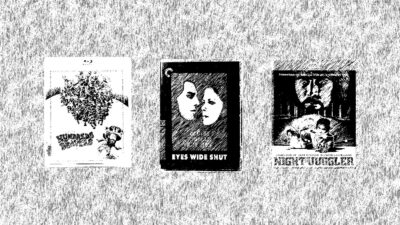











Comments